Today, January 21, we celebrate the feast of Saint Agnes of Rome, Virgin and Martyr of the Church. Saint Agnes maintained her faith, despite her young age (she was only around 12 years old!), consecrating herself to the Lord, defying the emperor, and earning the crown of Martyrdom! Honored as one of the four great virgin martyrs of the Church, Agnes is the patron saint of young women, chastity, and victims of sexual assault. Martyred at age twelve or thirteen, Agnes was one of the first women to be deemed a saint by the Church, and one of only seven women to be, excluding our Blessed Mother, to be commemorated by name in the Canon of the Mass. Her name, Agnes, translated from the Greek, means “chaste, pure, sacred.” She is generally depicted in art holding a palm leaf, heralding the arrival of Christ, and a lamb, as Christ is the “Lamb of God” who takes away the sins of the world.
Born into a wealthy Roman family during the reign of Emperor Diocletian, Agnes dedicated her young life to Christ, refusing suitors, and spurning worldly marriage. Given her grace and beauty, many wealthy and powerful families were interested in betrothing their sons to Agnes, but she remained chaste and focused only on her relationship with Christ, her “husband,” and the husband of the Church.
White some details are unclear regarding Agnes’ short life, tradition holds that a young Roman, likely the son of high-ranking prefect of Rom (either Maximum Herculeus or Sempronius), wanted to marry Agnes. Upon this request being made, Agnes is reported to have replied, ”The one to whom I am betrothed is Christ, whom the angels serve." With that, as Christians were forbidden to practice the faith at that time, under order of Emperor Diocletian, Agnes was forcibly removed from her home and brought before a judge to stand trial.
Saint Agnes was then subjected to various tortures and threats of torture, during which she never renounced her faith. The judges, losing patience, asked her to offer incense to the pagan god Minerva, which she refused. During the trial, a large crowd gathered, and one judge, taking pity on her and attempting to prevent her execution, offered her hand in marriage to the men in the crowd. Agnes adamantly refused, stating, "It is wrong for the bride to keep the bridegroom waiting. He who chose me first shall be the only one to have me. What are you waiting for, executioner? Destroy this body, for unwanted eyes may desire it." As such, a young man in the crowd who looked at Agnes lustfully was struck blind.
The judges ordered Agnes stripped naked and dragged through the streets of Rome to a brother, where she would be forced to lose her virginity. During the trip, Agnes’ hair miraculously grew, covering her body, and maintaining her chastity and purity. Pleading to Christ for aid, Agnes was left miraculously unharmed during this torment.
Having failed to convince Agnes to renounce Christ, she was sentenced to death. Agnes went to her death cheerfully, at peace, ready to be reunited with Christ. As her wrists were too small for shackles, she willingly accompanied her persecutors without restraints. At first, Agnes was tied to a pyre to be burnt alive, but the wood reportedly would not catch fire. She was then stabbed in the throat, a death considered “gentle,” and reserved for women at that time. Tradition suggests that her blood did not soak into the ground, but remained, and was later removed by Christians using clean white woolen cloths.
Two days later, Agnes’ foster sister (the daughter of her wet nurse), Emerentiana, visited Agnes’ grave to pray for her soul. Discovered by a group of Roman citizens, Emerentiana was stoned to death, a martyr for her faith, and later canonized by the Church. Her feast day is January 23.
Agnes body was buried outside the city of Rome, rather than being thrown into the River Tiber as was common at the time. Her parents, who visited the grave via an underground tunnel, reported seeing a vision of Agnes, surrounded by other virgins, with a lamb at her side. Years later, during the reign of Constantine (when Christianity was again acceptable), his daughter Constantina was miraculously cured of leprosy after visiting the grave of Saint Agnes. Following that miracle, a great basilica was built in her honor, known as Sant'Agnese Fuori la Mura (The Basilica of St. Agnes Outside the Wall).
Each year, in honor of Agnes’ purity, a solemn feast day Mass is held. During that Mass, two young lambs from the fold raised by Trappist monks of the Tre Fontane Monastery are crowned and placed in straw baskets, decorated with red and white flowers and streamers. The red represents the martyrdom of Saint Agnes, while the white represents her purity. Shortly after the feast day Mass, held at the Basilica of Saint Agnes, a procession composed of young girls in white dresses and veils, carrying the lambs upon their shoulders, occurs. The lambs are ceremoniously incensed and blessed before being brought to the Pope at the Vatican who also blessed them. The lambs are raised under the care of the Benedictine Nuns of Santa Cecilia until Maundy Thursday, at which time they are sheared. From the wool, pallia, embroidered white stoles adorned with six small crosses, are woven. These stoles are bestowed on archbishops by the Pope, their unique shape and custom representing the union of the Church with Christ, the Good Shepherd.
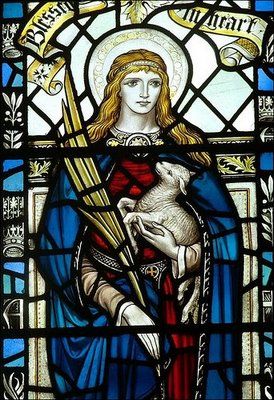 The brief life of Saint Agnes teaches us important lessons about faith, conviction, and courage. Even at such a young age, Agnes withstood torture, pressure from adults, peers, and family, and eventual death for her beliefs. She valued her chastity and purity above all else, so as to be ready for perfect union with Christ in heaven. We look to Saint Agnes as inspiration during our daily lives, as we make decisions that may compromise our chastity and purity. We remember Agnes as we strive toward a more pure relationship with our Lord.
The brief life of Saint Agnes teaches us important lessons about faith, conviction, and courage. Even at such a young age, Agnes withstood torture, pressure from adults, peers, and family, and eventual death for her beliefs. She valued her chastity and purity above all else, so as to be ready for perfect union with Christ in heaven. We look to Saint Agnes as inspiration during our daily lives, as we make decisions that may compromise our chastity and purity. We remember Agnes as we strive toward a more pure relationship with our Lord.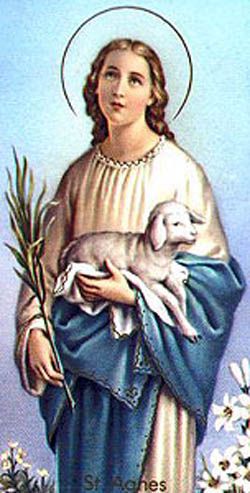 On a personal note, as a child psychologist, my general worldview includes the belief that we can learn alot about from the youth of our world. Children and adolescents never fail to surprise us with their insights and courage-- and if we look around the world today, we see examples of that. So it is with the young Catholic saints who continue to inspire us-- saints like Saint Agnes and Saint Agatha, Saint Pancras and Saint Germaine, Saints Jacinta and Francisco Marto.
On a personal note, as a child psychologist, my general worldview includes the belief that we can learn alot about from the youth of our world. Children and adolescents never fail to surprise us with their insights and courage-- and if we look around the world today, we see examples of that. So it is with the young Catholic saints who continue to inspire us-- saints like Saint Agnes and Saint Agatha, Saint Pancras and Saint Germaine, Saints Jacinta and Francisco Marto. Saint Ambrose of Milan wrote of Saint Agnes: “Today is the birthday of a virgin; let us imitate her purity. It is the birthday of a martyr; let us offer ourselves in sacrifice. It is the birthday of Saint Agnes, who is said to have suffered martyrdom at the age of twelve. There was little or no room in that small body for a wound. Yet she shows no fear of the blood-stained hands of her executioners. She offers her whole body to be put to the sword by fierce soldiers. She is too young to know of death, yet is ready to face it. Dragged against her will to the altars, she stretches out her hands to the Lord in the midst of the flames, making the triumphant sign of Christ the victor on the altars of sacrilege. She puts her neck and hands in iron chains, but no chain can hold fast her tiny limbs. In the midst of tears, she sheds no tears herself. She stood still, she prayed, she offered her neck. You could see fear in the eyes of the executioner, as if he were the one condemned. His right hand trembled, his face grew pale as he saw the girl’s peril, while she had no fear for herself. One victim, but a twin martyrdom, to modesty and religion; Agnes preserved her virginity and gained a martyr’s crown.”
Saint Ambrose of Milan wrote of Saint Agnes: “Today is the birthday of a virgin; let us imitate her purity. It is the birthday of a martyr; let us offer ourselves in sacrifice. It is the birthday of Saint Agnes, who is said to have suffered martyrdom at the age of twelve. There was little or no room in that small body for a wound. Yet she shows no fear of the blood-stained hands of her executioners. She offers her whole body to be put to the sword by fierce soldiers. She is too young to know of death, yet is ready to face it. Dragged against her will to the altars, she stretches out her hands to the Lord in the midst of the flames, making the triumphant sign of Christ the victor on the altars of sacrilege. She puts her neck and hands in iron chains, but no chain can hold fast her tiny limbs. In the midst of tears, she sheds no tears herself. She stood still, she prayed, she offered her neck. You could see fear in the eyes of the executioner, as if he were the one condemned. His right hand trembled, his face grew pale as he saw the girl’s peril, while she had no fear for herself. One victim, but a twin martyrdom, to modesty and religion; Agnes preserved her virginity and gained a martyr’s crown.”Saint Agnes' relics are conserved in the church of Sant'Agnese fuori le mura (Saint Agnes Outside the Walls) in Rome, which was constructed atop the catacomb that housed Agnes' tomb. Her skull is preserved in a side chapel in the church of Sant'Agnese in Agone in Rome's Piazza Navona.
Prudentius, the fourth century Christian poet and hymnographer wrote the following hymn of praise in honor of Saint Agnes of Rome:
THE PASSION OF AGNES
The native home of Romulus now enshrines
The tomb of Agnes, virgin and martyr blest.
Reposing there in sight of its lofty towers,
The maiden watches over the sons of Rome,
And pilgrims, too, enjoy here protecting care,
Who pray to her with pure and believing hearts.
With splendid twofold diadem she is crowned:
Virginity unmarred by the stain of sin
And glory won by freely embracing death.
That maiden, they relate, who was not yet ripe
For marriage vows and still but a child in years,
Her soul aflame with rapturous love of Christ,
Withstood the impious edict to sacrifice
To idols and abandon her holy Faith.
Assailed at first by every art and wile,
Now by the coaxing words of a fawning judge,
Now by the butcher's sinister threats of doom,
Dauntless she stood, nor shrank from her stern resolve,
Willing to give her body to torments sore,
Nor quailing from the threat of a cruel death.
Then spoke the angry tyrant: 'If she can face
The thought of grinding torture and woeful pangs,
And sets at naught her life as of little worth,
Her consecrated chastity she holds dear.
Into a common den of impurity
I am resolved to cast her unless she bows
Before Minerva's altar and begs her grace,
That virgin she, a virgin, has dared despise.
There all the youths in wanton delight will rush,
To seek this newest slave of their lustful sport.
Then Agnes answered: 'Never will Christ forget
His own nor let our precious virginity
Be snatched from us. He will not abandon us.
He ever shields the chaste and will not permit
The gift of holy purity to be soiled.
My blood may dye your sword, if it is your will,
But never will my body be stained with lust.
So spoke the maid; the prefect then gave command
That she should stand exposed in the public square.
As there she stood, the pitying throngs fell back 40
And turned their eyes away in respectful awe,
None daring to regard her with brazen look.
It chanced that one was forward enough to fix
His gaze upon the maiden and did not fear
To look with lustful eye on her sacred form,
But lo, a flame as swift as a lightning flash
Quick struck his wanton eyes with its trembling dart.
The youth fell down and, blinded by glaring light,
Lay panting in the dust of the crowded street.
His fellows lifted him from the ground, half-dead,
Bewailing him with clamorous words and tears.
The virgin went forth singing a hymn of praise
In thanks to God the Father and Christ, His Son,
That when exposed to peril of vilest stain,
Her chastity had triumphed, and she had found
The den of squalid infamy clean and pure.
Some tell that Agnes, asked to implore of Christ
That He restore the sight of the guilty wretch,
Poured forth a fervent prayer, and the prostrate youth
Regained the breath of life and his vision whole.
In her ascent to heaven the saint had passed
But the first step; a second was yet to come.
The bloody tyrant burned with revengeful ire.
'I am outdone,' he groaned. 'Go, unsheathe your sword,
You soldier there, and carry into effect
The laws our prince and sovereign lord decreed.
When Agnes saw the furious headsman stand
With weapon drawn, in transports of joy she cried:
Tar happier am I that a swordsman comes,
A wild uncouth barbarian, fierce and grim,
Than that a languid suitor pays court to me,
A lovesick creature, scented with rare perfumes,
Who would destroy my soul with my chastity.
This butcher is the lover who pleases me:
His bold advances I shall go forth to meet
And will not try to hinder his ardent suit.
I gladly bare my breast to his cruel steel
And deep into my heart I will draw his blade.
Thus as the bride of Christ I shall mount above
The darkness of the world to the realms of light.
Eternal King, unfasten the gates of heaven
That till of late were closed to the sons of earth,
And call Thy virgin spouse to Thyself, O Christ,
A victim to the Father now sacrificed.
As Agnes spoke these words, she inclined her head
In humble prayer to Christ, that her gentle neck
Might readier be to suffer the threatened wound.
Thus was her ardent longing fulfilled at last,
For with one blow the soldier struck off her head
And speedy death prevented all sense of pain.
Then putting off the garment of flesh, her soul
Flies forth and speeds untrammeled into the skies,
Her shining path surrounded by angel choirs.
In wonder she looks down on the world below;
On high she views the darkness beneath her feet,
And at the circling wheel of the sun she laughs
As round its orb the heavenly spheres revolve.
She sees the raging whirlwind of human life
And all the vanities of the fickle world:
Despots and kings, imperial power and rank,
The pageantry of honor and foolish pride,
The thirst for gold and silver, which all men seek
And gain by every species of wickedness,
The stately palaces with their gilded walls,
The vain display of richly embroidered robes,
The hatreds, fears, desires and impending woes,
The long enduring griefs and the fleeting joys,
Black envy with its smoking firebrands that blight
The hopes of men and tarnish all human fame,
And last, but worse than every other ill,
The sordid clouds and darkness of pagan rites.
All these things Agnes tramples beneath her feet,
And with her heel she crushes the dragon's head,
That monster vile who poisons all things of time
And plunges them into the infernal pit.
But vanquished now and under the virgin's foot
He lies crestfallen, prone in the dust of earth,
His fiery head not daring to lift again.
Meanwhile the virgin martyr's unsullied brow
God circles with a glorious twofold crown:
One glowing with the rays of eternal light,
A sixty-fold reward, and the other fruit,
Increased a hundred-fold, of celestial grace.
O happy virgin, glory but lately dawned,
O noble dweller in the celestial courts,
Adorned with thy resplendent twin diadem,
Deign now to turn thy face on our miseries.
To thee alone the Father of all has given
Power to make pure the dwelling of sin itself.
I, too, shall be made clean by thy radiant glance
If thou wilt fill my heart with its gracious light.
All is pure where thou deignest in love to dwell,
Or where thine own immaculate foot may tread.
Almighty and everlasting God, who choose those whom the world deems powerless to put the powerful to shame: Grant us so to cherish the memory of your youthful martyr Agnes, that we may share her pure and steadfast faith in you; through Jesus Christ our Lord, who lives and reigns with you and the Holy Spirit, one God, for ever and ever. Amen.










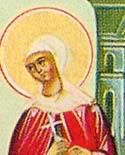
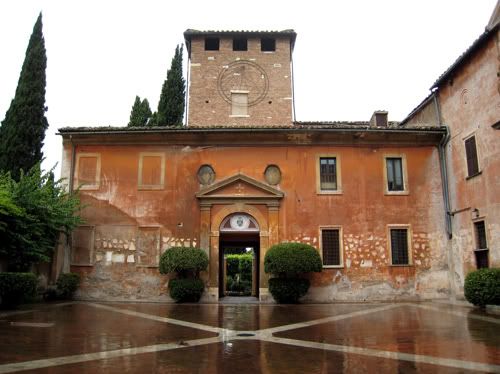
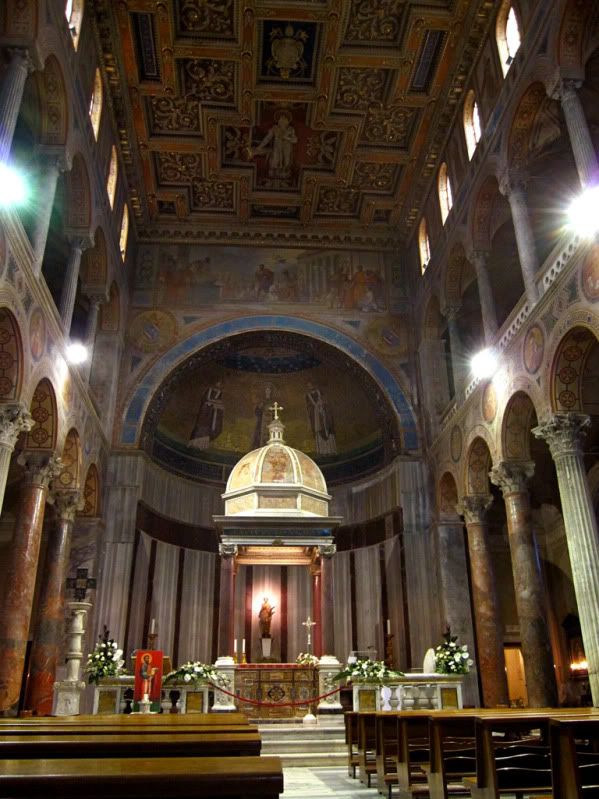
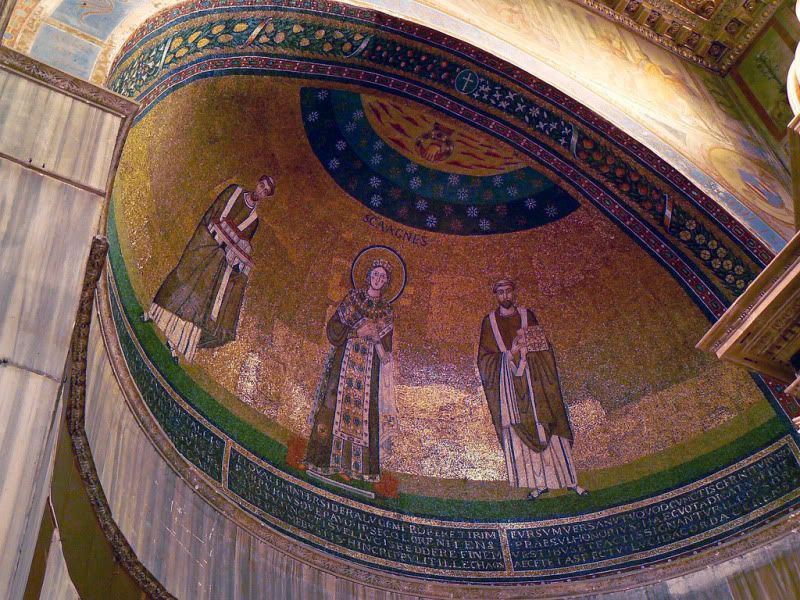
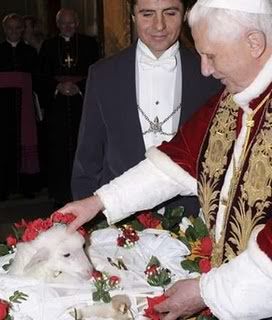
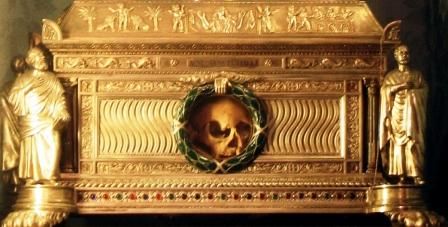
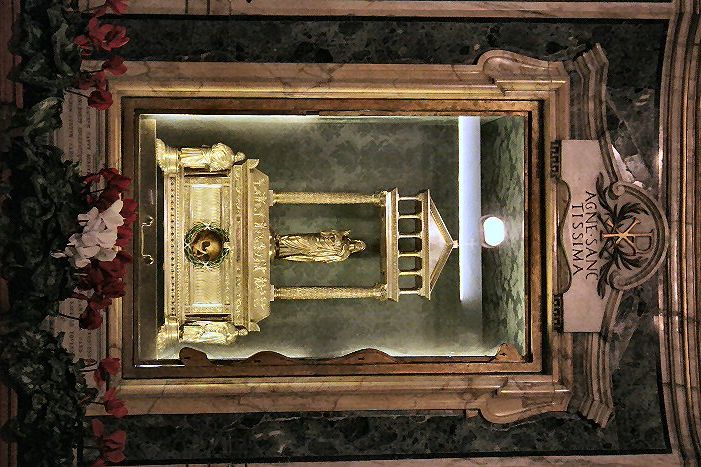

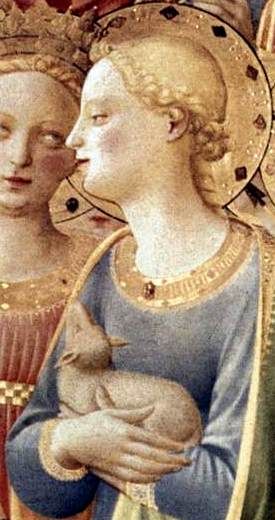
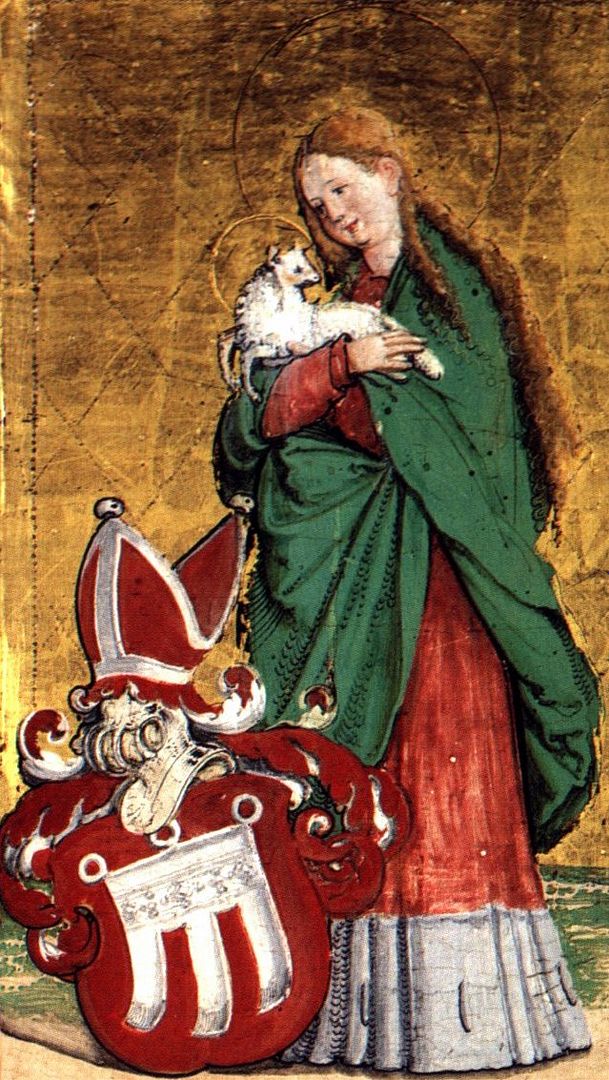
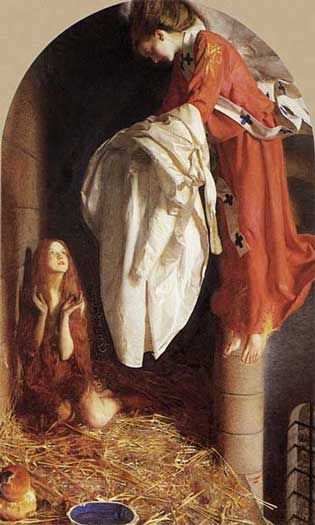

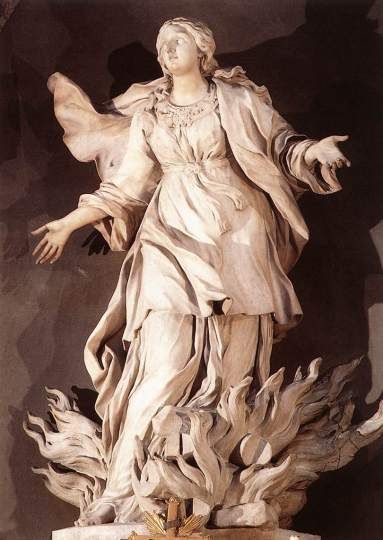

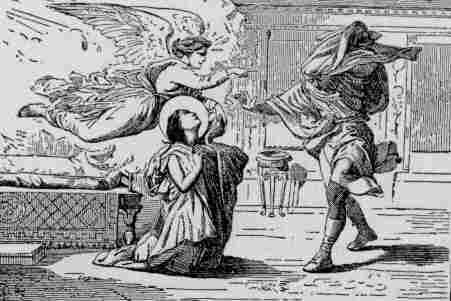
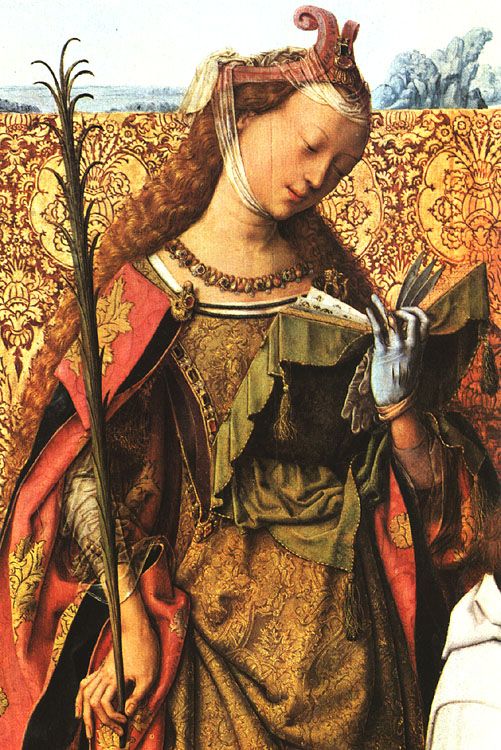

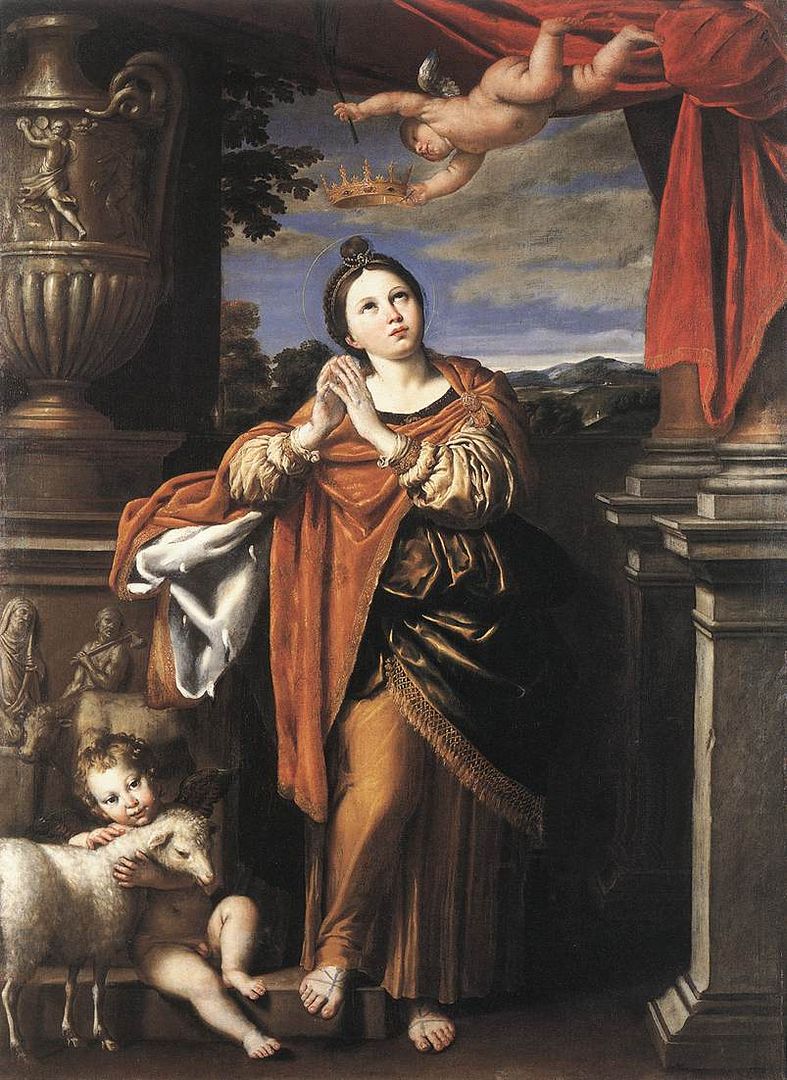
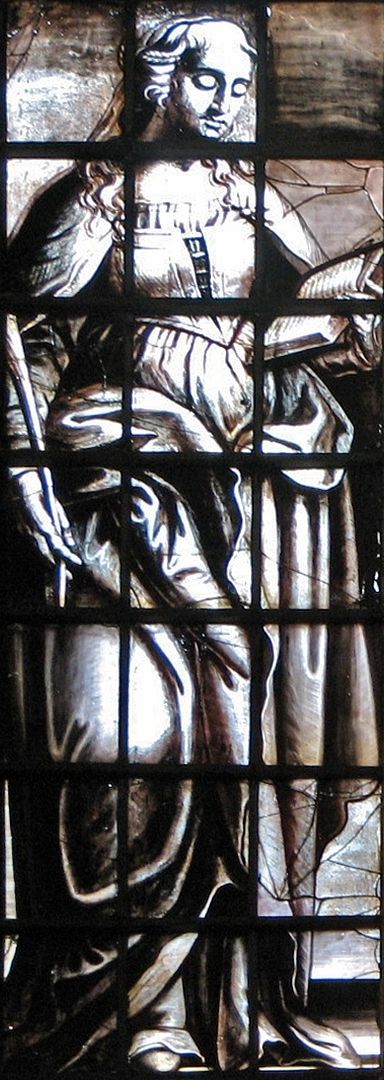



0 comments:
Post a Comment
Thanks for leaving a comment. If you wish to submit a prayer request, however, please do so above, using the "Contact" tab.